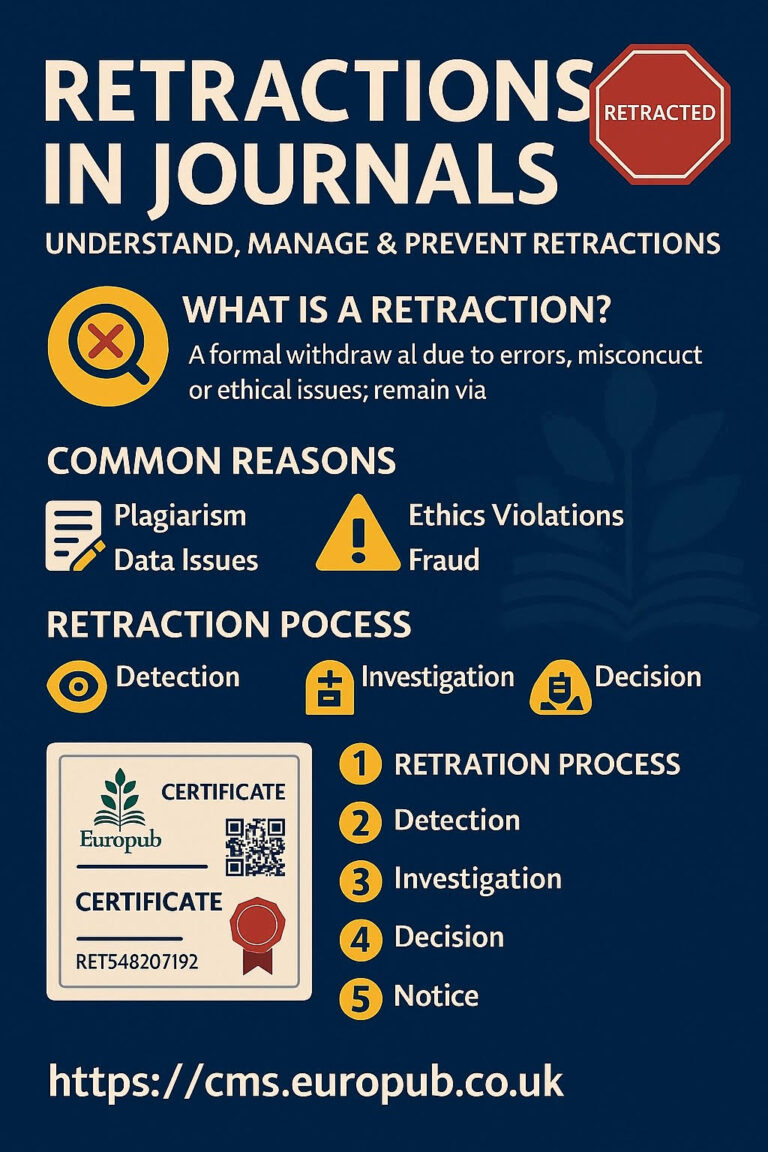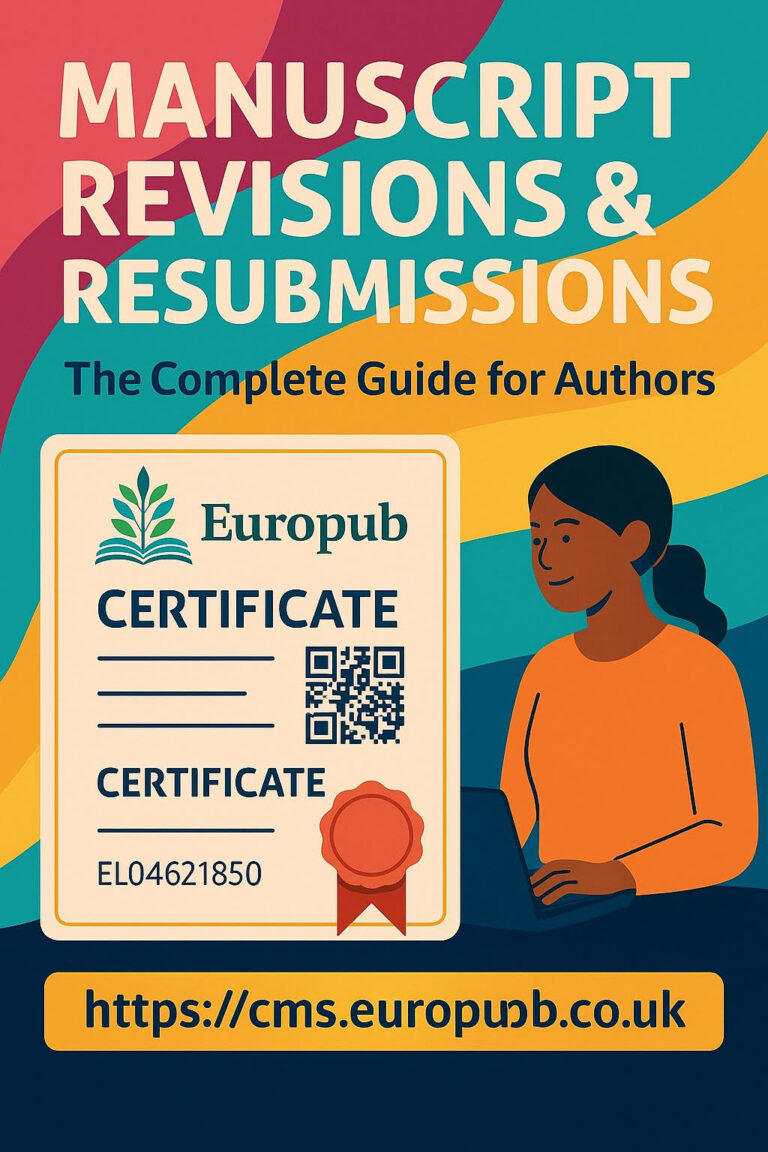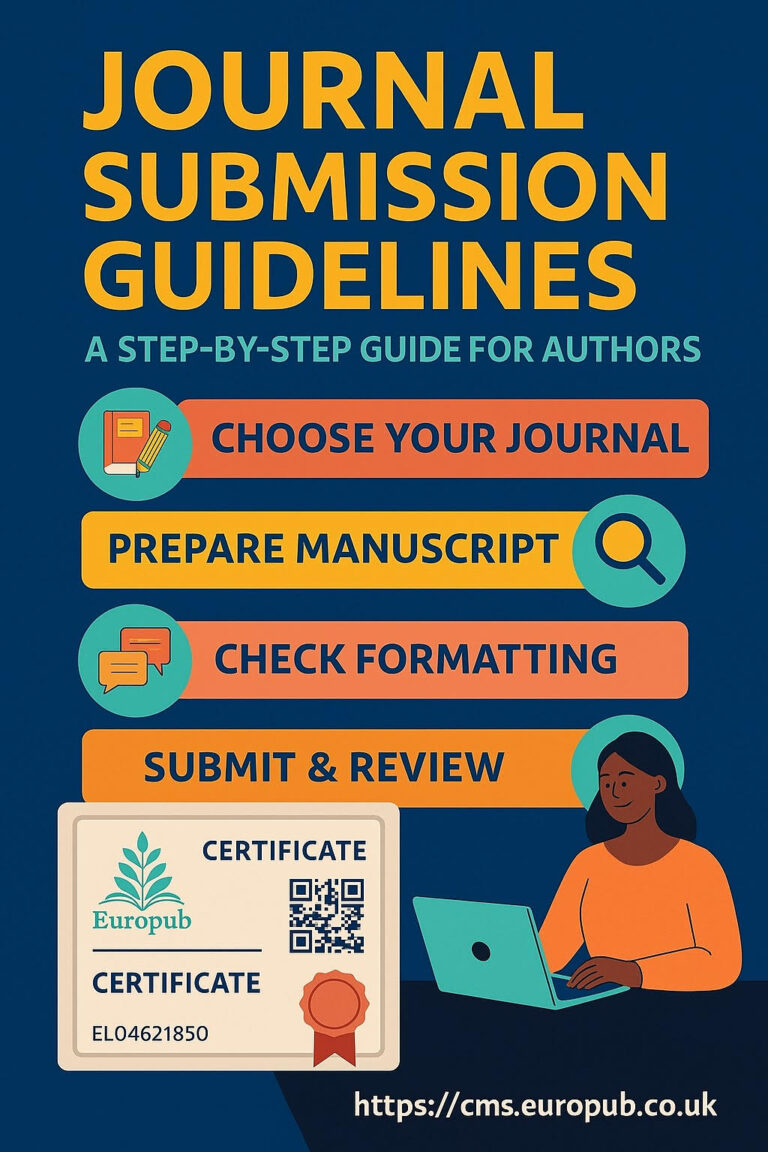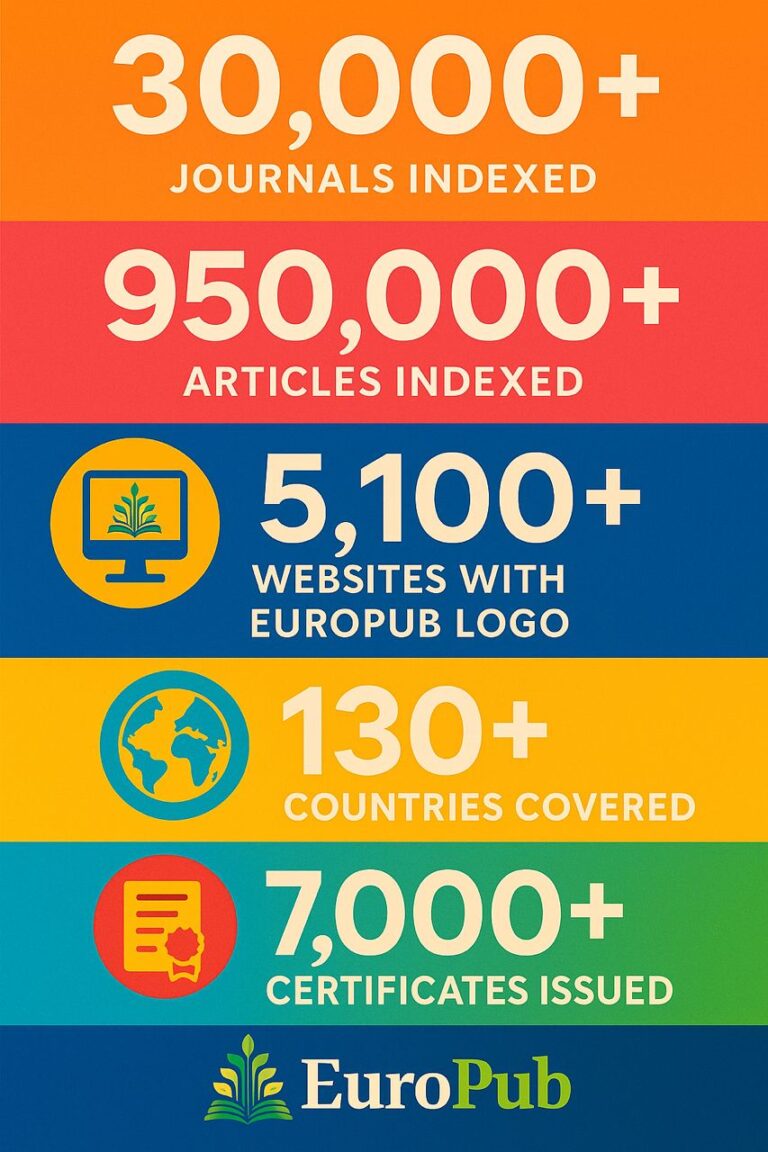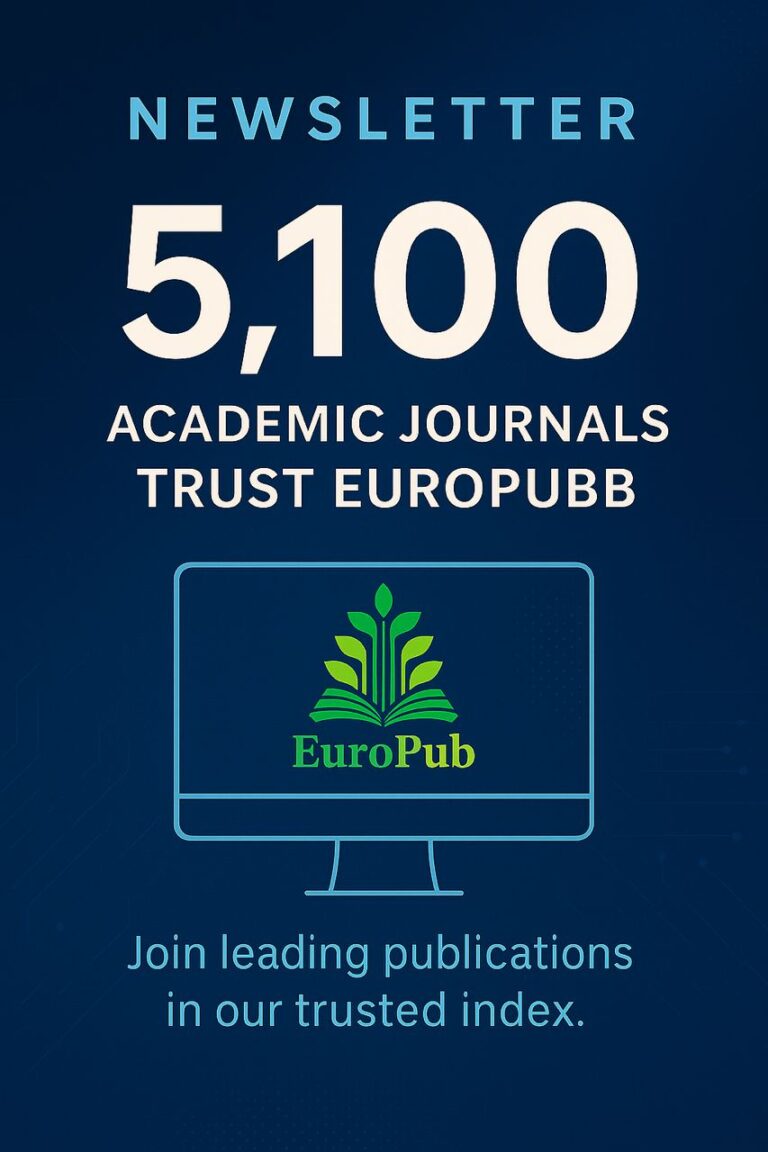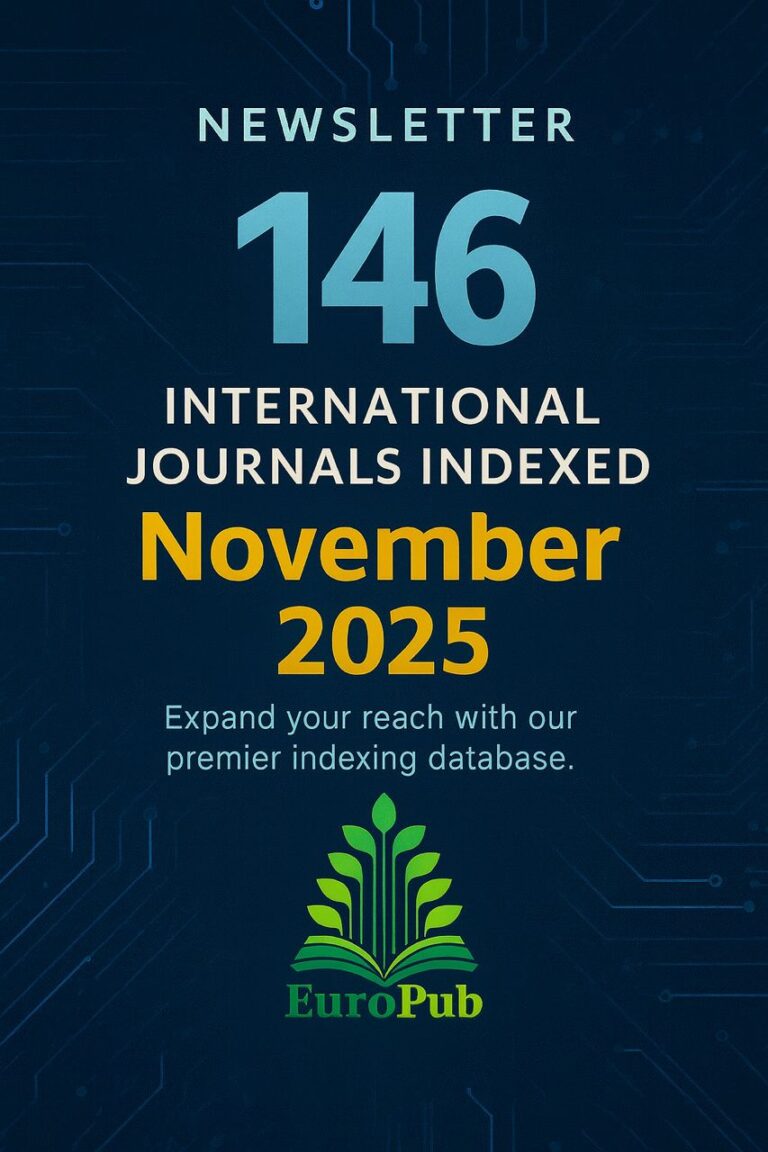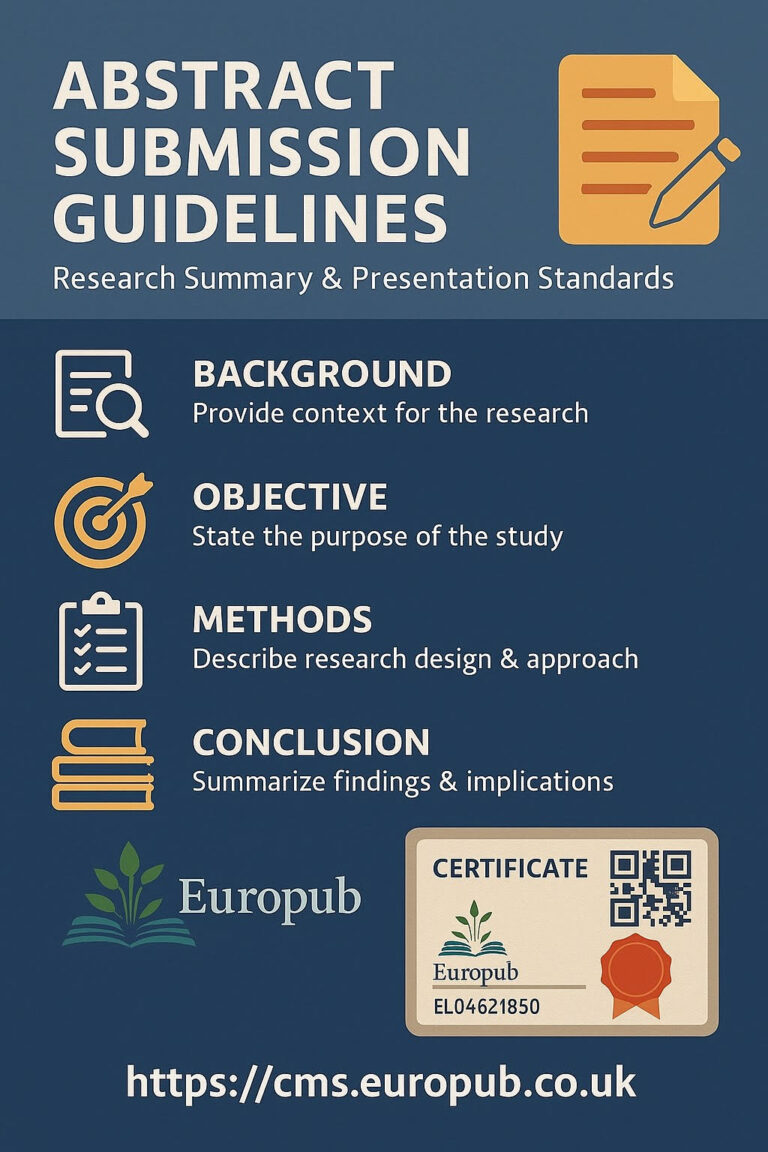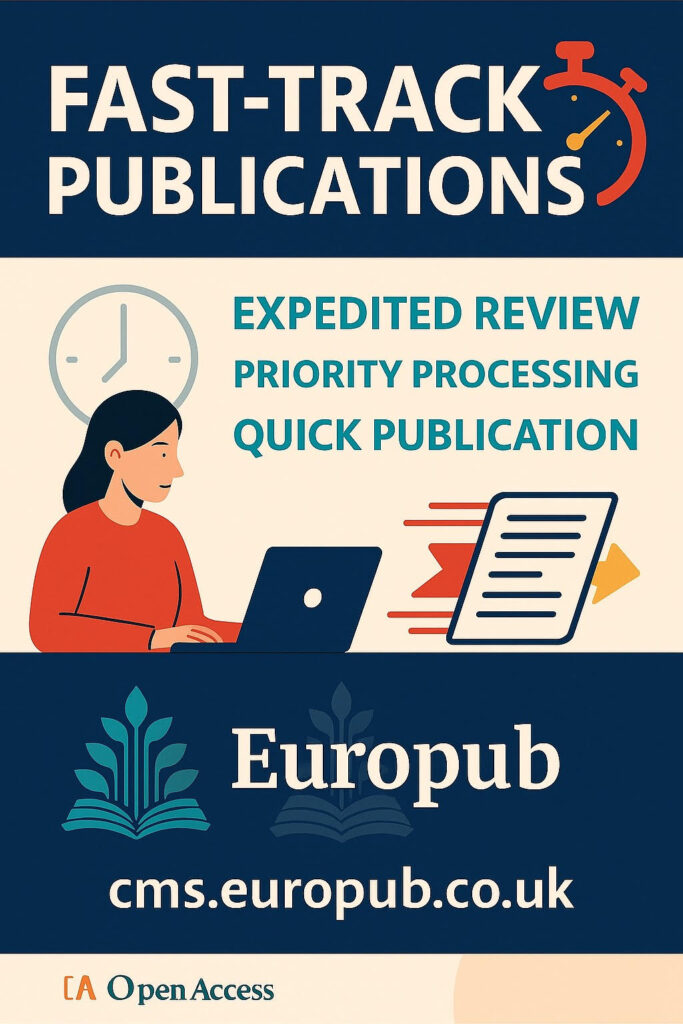
(Prepared by Europub Publishing Company Ltd. UK)
What Is a Fast-Track Publication?
A Fast-Track Publication (also known as Rapid Review or Accelerated Publication) is a service offered by reputable journals to speed up the peer review and publication process — often within 2–6 weeks instead of the traditional 3–6 months.
It’s designed for high-impact, time-sensitive, or novel findings that need to reach the scientific community quickly — for example, clinical results, public health data, AI innovations, or breakthrough discoveries.
Why Authors Choose Fast-Track?
 Rapid Visibility: Get published online first within weeks.
Rapid Visibility: Get published online first within weeks.
 Priority Review: Immediate assignment to senior editors and top reviewers.
Priority Review: Immediate assignment to senior editors and top reviewers.
 Citation Advantage: Early dissemination increases citation potential.
Citation Advantage: Early dissemination increases citation potential.
 Policy Impact: Useful for urgent or high-stakes research areas (e.g., pandemics, climate policy, new technologies).
Policy Impact: Useful for urgent or high-stakes research areas (e.g., pandemics, climate policy, new technologies).
 Prestige: Signals high importance and journal commitment to timely science.
Prestige: Signals high importance and journal commitment to timely science.
How the Fast-Track Process Works
- Manuscript Submission: Authors select Fast-Track option during submission.
- Initial Screening: Editor checks scope, novelty, and ethical compliance.
- Accelerated Review:
- Reviewers commit to 3–7 days turnaround.
- Editor’s decision within 10–14 days.
- Rapid Revision Cycle: Authors given 1–2 weeks for revisions.
- Acceptance & Production: Copyediting, DOI assignment, and online-first release within 7 days.
- Full Issue Integration: Later added to the journal’s volume/issue and indexing databases (Scopus, WoS, PubMed).
Total turnaround: 15–30 days (average)
Quality Assurance
Even with rapid timelines, journals must maintain rigorous standards:
- Double-blind peer review
- Plagiarism & similarity check (iThenticate)
- Ethics & COPE compliance
- No compromise on review depth
- Transparent editorial workflow
When Should You Use Fast-Track?
Use fast-track publishing when:
- You have urgent, high-impact findings
- You want timely citations for grant/funding deadlines
- You are preparing policy-relevant or clinical data
- You need publication confirmation for academic promotion
Avoid it if your manuscript still requires significant development — quality always comes first.
Costs & Policies
Many publishers charge a Fast-Track Processing Fee (FTPF) — separate from or added to the Article Processing Charge (APC).
Fees vary from $150 to $1000+, depending on:
- Journal indexing level (ISI, Scopus, PubMed)
- Review model (single-blind / double-blind)
- Publisher (Elsevier, Springer, Taylor & Francis, Europub, etc.)
 Europub Partner Journals offer affordable, transparent options.
Europub Partner Journals offer affordable, transparent options.
Check the submission portal: https://cms.europub.co.uk
Fast-Track Benefits for Journals
- Attract high-quality, time-sensitive research.
- Improve journal impact factor and visibility.
- Boost author satisfaction and trust.
- Increase media attention and policy relevance.
Fast-Track vs. Regular Publication
| Feature | Fast-Track | Regular |
|---|---|---|
| Review Time | 7–14 days | 4–12 weeks |
| Revision Window | 1 week | 2–4 weeks |
| Acceptance Decision | 2–3 weeks | 2–4 months |
| Online First | Immediate | After issue release |
| APC | Slightly higher | Standard |
| Ideal for | Urgent or impactful studies | Routine publications |
Beware of Fake Fast-Track Offers
Many predatory journals exploit authors by falsely promising fast-track publishing.
To protect yourself:
 Avoid journals that:
Avoid journals that:
- Guarantee acceptance within 24–48 hours.
- Request payment before review.
- Lack indexing (Scopus, WoS, DOAJ).
- Have fake editorial boards or unverifiable editors.
- Use generic Gmail/Yahoo submission addresses.
 Check authenticity via:
Check authenticity via:
FAQ — Fast-Track Publications (30+ Questions & Answers)
Q1. Does Fast-Track mean lower quality?
No — only the review timeline is shortened, not the standards.
Q2. Who reviews Fast-Track papers?
Senior, experienced reviewers selected for quick yet deep evaluation.
Q3. Are Fast-Track papers cited more often?
Usually yes — due to earlier visibility.
Q4. Can I request Fast-Track after submission?
Some journals allow it before peer review begins.
Q5. Is Fast-Track available for all article types?
Mainly for Original Research, Reviews, Short Communications, and Clinical Reports.
Q6. What happens if reviewers delay feedback?
Editor reassigns to backup reviewers immediately.
Q7. Is Fast-Track available in all Europub journals?
Yes, through https://cms.europub.co.uk.
Q8. Is the APC higher for Fast-Track?
Yes — 10–30% higher than standard publication.
Q9. Will Fast-Track help me graduate or apply for a grant?
Yes, it provides verified publication proof quickly.
Q10. Can I withdraw a Fast-Track paper later?
Yes, anytime before acceptance.
Q11. How do I know if my paper qualifies?
Check journal’s “Author Guidelines” section or contact the editor.
Q12. Can I combine Fast-Track with Open Access?
Yes — most publishers allow both.
Q13. How can I track progress?
Through the manuscript system (dashboard or email updates).
Q14. What happens if the paper is rejected?
It can be transferred to regular review or another journal.
Q15. Is Fast-Track ethically approved?
Yes, when transparent and COPE-compliant.
Q16. Can I request refund if delayed?
Depends on journal policy — Europub offers partial refunds if delay exceeds 30 days.
Q17. Can early-career researchers use Fast-Track?
Yes — it’s a good choice for rapid career visibility.
Q18. Are preprints considered Fast-Track?
No, but preprints can complement Fast-Track exposure.
Q19. Is Fast-Track indexing faster too?
Yes — metadata and DOI submission are prioritized.
Q20. What is “Online First”?
Articles published online before being assigned to an issue.
Q21. Can I request reviewer suggestions?
Yes, but journal reserves final choice.
Q22. Does Fast-Track affect Impact Factor?
Indirectly — by increasing visibility and citations sooner.
Q23. Is it possible for review to still take long?
Rarely, but complex papers may require extended reviews.
Q24. What ensures review quality in short time?
Experienced reviewers and dedicated editorial workflow.
Q25. How does Europub monitor Fast-Track integrity?
By time-stamped review records, QR-certified certificates, and transparent dashboard.
Q26. What are typical fields using Fast-Track?
Medical sciences, AI, energy, environment, policy, and engineering.
Q27. What are red flags for fake Fast-Track journals?
No indexing, Gmail contact, fake editors, unrealistic timelines (<5 days).
Q28. Can Fast-Track lead to early citation in Scopus/WoS?
Yes — because it enters the database immediately.
Q29. Are Fast-Track publications peer-reviewed?
Yes — 100% reviewed; otherwise, it’s unethical.
Q30. Where can I verify Fast-Track journals?
Check https://cms.europub.co.uk or https://mjl.clarivate.com.
Useful Links
 https://cms.europub.co.uk – Certificate & Submission System
https://cms.europub.co.uk – Certificate & Submission System https://europub.co.uk – Main Europub Database
https://europub.co.uk – Main Europub Database https://news.europub.co.uk – Research News & Announcements
https://news.europub.co.uk – Research News & Announcements https://publicationethics.org – COPE Guidelines
https://publicationethics.org – COPE Guidelines https://doaj.org – Open Access Verification
https://doaj.org – Open Access Verification











